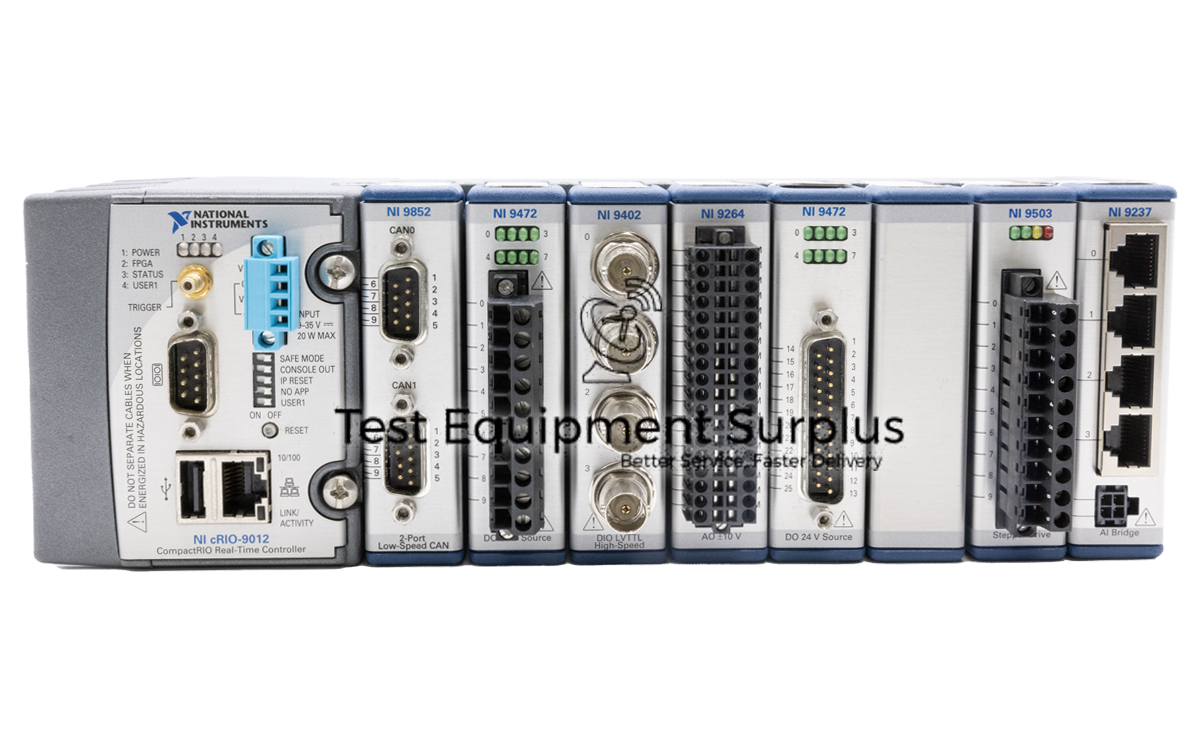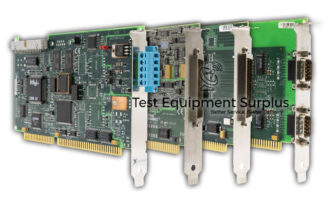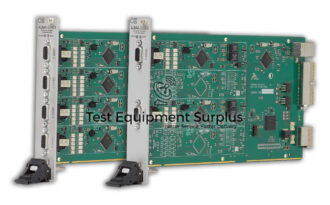Description
The National Instruments cRIO-9024 CompactRIO Controller, with part numbers 781174-01 and 193965E-01L, is a versatile device designed for easy installation on a chassis.
It features a primary Ethernet port that supports a network connection via CAT-5 or better cables, with a maximum cable length of under 100 meters, while the secondary Ethernet port is intended for use with Measurement and Automation Explorer and necessitates a distinct IP address.
During the power-on-self-test (POST), the status LEDs and power indicator turn on, and the LEDs switch off upon successful completion of the test.
Upon initial startup, the controller boots into safe mode and attempts to connect to a network using DHCP or falls back to a local IP address if DHCP is not available.
The cRIO-9024 is equipped with an 800 MHz CPU, 512 MB of DRAM, and 4 GB of nonvolatile storage memory, ensuring efficient and reliable performance.
The integrated RS-232 DTE Serial Port supports a baud rate ranging from 600 bps to 230400 bps, a data bit range of 5 to 8, parity options including even, odd, space, and none, and flow control mechanisms like DTR/DSR, RTS/CTS, and XON/XOFF.
Additionally, the high-speed USB port offers a maximum transfer speed of 480 MB/s and supports devices with a power consumption of up to 500 mA.
| Specification | Detail |
|---|---|
| Product Name | National Instruments cRIO-9024 CompactRIO Controller |
| Part Numbers | 781174-01, 193965E-01L |
| Installation | Can be installed on a chassis |
| Primary Ethernet Port | For Ethernet network using CAT-5 or better cable, cable length should be less than 100 meters |
| Secondary Ethernet Port | Use with Measurement and Automation Explorer, requires a different IP address |
| Power-On-Self-Test (POST) | Status LEDs and power turn on during POST, LEDs turn off to indicate completion |
| Boot Behavior | Boots into safe mode initially, attempts to connect to network by DHCP or local IP if DHCP is unavailable |
| CPU Frequency | 800 MHz |
| DRAM | 512 MB |
| Storage Memory | 4 GB nonvolatile |
| RS-232 DTE Serial Port | Baud rate: 600 bps to 230400 bps; Data bits: 5 to 8; Parity: Even, Odd, Space, None; Flow control: DTR/DSR, RTS/CTS, XON/XOFF, None |
| High-Speed USB Port | Maximum transfer speed: 480 MB/s; Maximum power usage: 500 mA |
Question 1: What are the specifications and features of the National Instruments cRIO-9024 CompactRIO Controller, including its power-up process and network connectivity options?
Answer 1: The RS-232 DTE Serial Port of the National Instruments cRIO-9024 CompactRIO Controller supports a wide range of baud rates from 600 bps to 230400 bps, offers different data bit options from 5 to 8, includes parity options such as even, odd, space, and none, and incorporates various flow control mechanisms like DTR/DSR, RTS/CTS, and XON/XOFF, which provide versatility in data transmission rates and compatibility with
Question 2: What are the primary and secondary Ethernet port functionalities of the National Instruments cRIO-9024 CompactRIO Controller, and how do they differ in terms of network connection and IP address configuration?
Answer 2: The National Instruments cRIO-9024 CompactRIO Controller is equipped with an 800 MHz CPU, 512 MB of DRAM, and 4 GB of nonvolatile storage memory. It features a primary Ethernet port for CAT-5 or better network connections with a maximum cable length of under 100 meters and a secondary Ethernet port for use with Measurement and Automation Explorer, which requires a separate IP address. During the power-on-self-test (POST), the status LEDs and power indicator illuminate and
Question 3: What is the purpose of the secondary Ethernet port on the National Instruments cRIO-9024 CompactRIO Controller, and does it require a distinct IP address for operation?
Answer 3: The National Instruments cRIO-9024 CompactRIO Controller is designed for easy installation on a chassis and features a primary Ethernet port for CAT-5 or better network connections with a 100-meter maximum cable length, and a secondary Ethernet port for use with Measurement and Automation Explorer, requiring a separate IP address. Upon powering up, it performs a self-test with status LEDs and a power indicator that turn off once the test is successful, boots into safe mode, and connects to a network using DHCP
Question 4: What are the specifications and networking capabilities of the National Instruments cRIO-9024 CompactRIO Controller, including details about its Ethernet ports, power-on-self-test, initial boot mode, processor speed, memory, serial port configuration, and USB port functionality?
Answer 4: The primary Ethernet port of the National Instruments cRIO-9024 CompactRIO Controller is used for network connections with CAT-5 or better cables and supports a maximum cable length of under 100 meters, while the secondary Ethernet port is specifically for use with Measurement and Automation Explorer and requires a separate IP address, differing from the primary in its dedicated purpose and IP configuration.
Question 5: What capabilities of the National Instruments cRIO-9024 CompactRIO Controller’s RS-232 DTE Serial Port differentiate it in terms of data transmission and peripheral support?
Answer 5: The secondary Ethernet port on the National Instruments cRIO-9024 CompactRIO Controller is intended for use with Measurement and Automation Explorer, and it does require a distinct IP address to operate.



